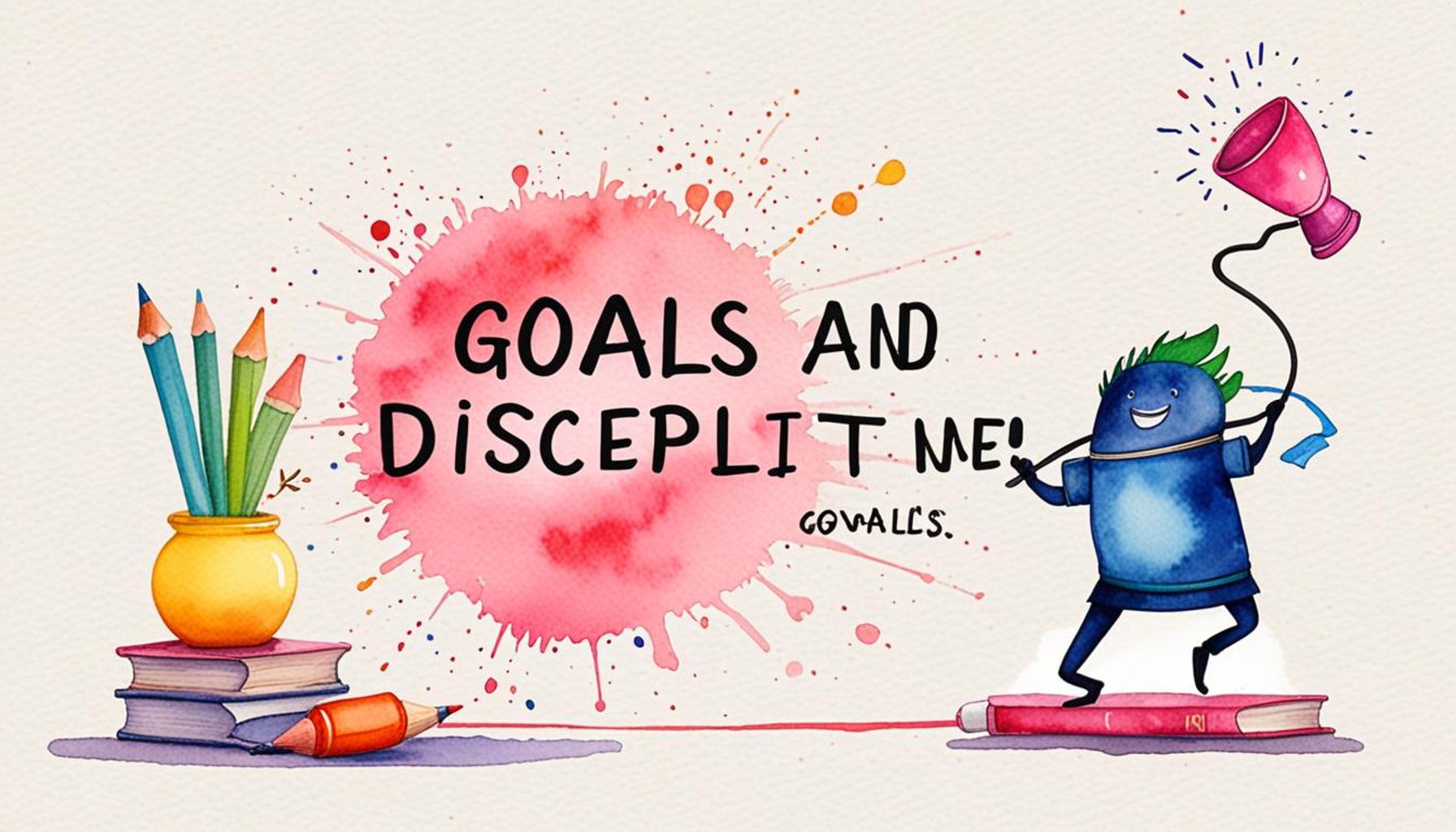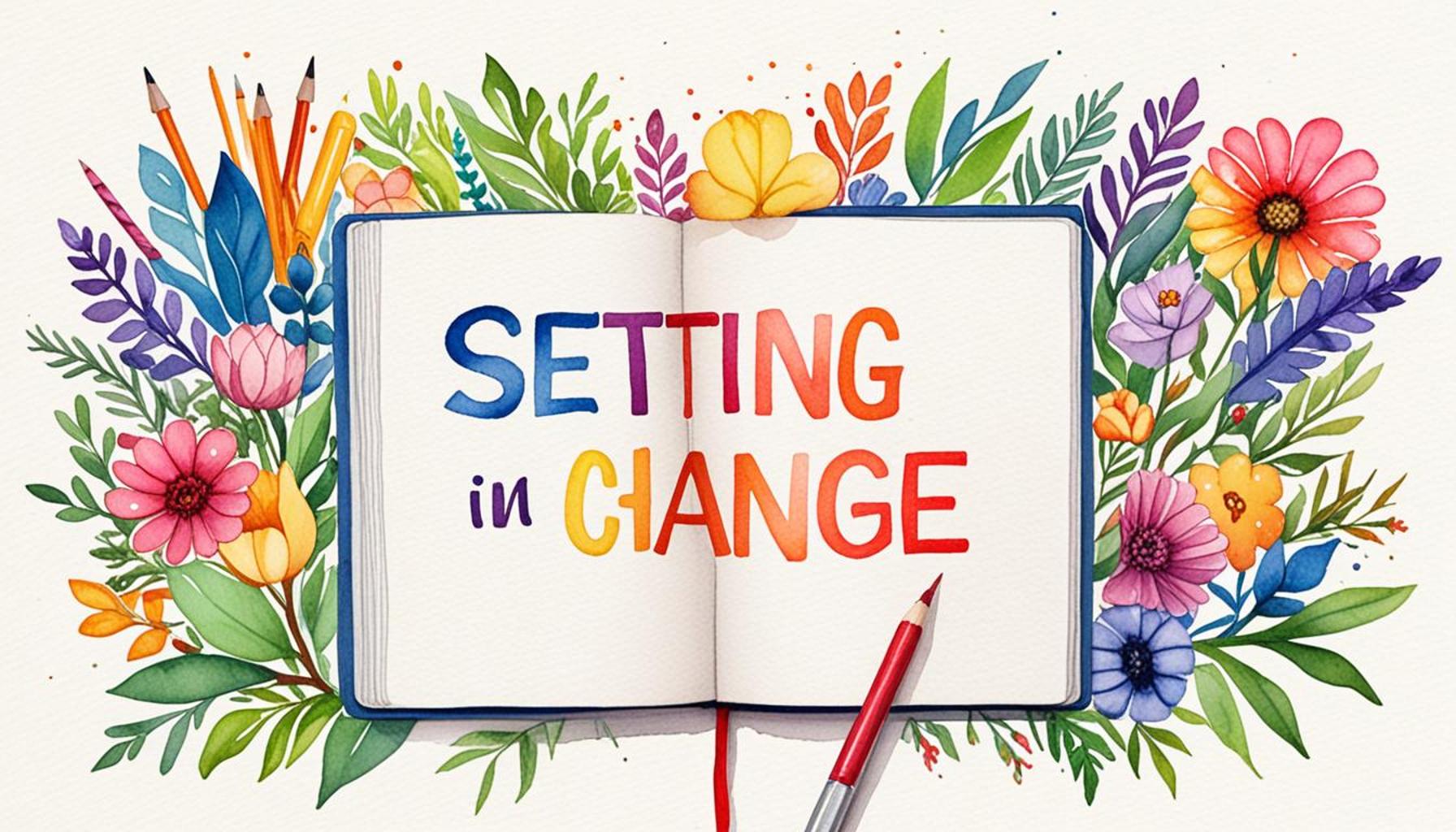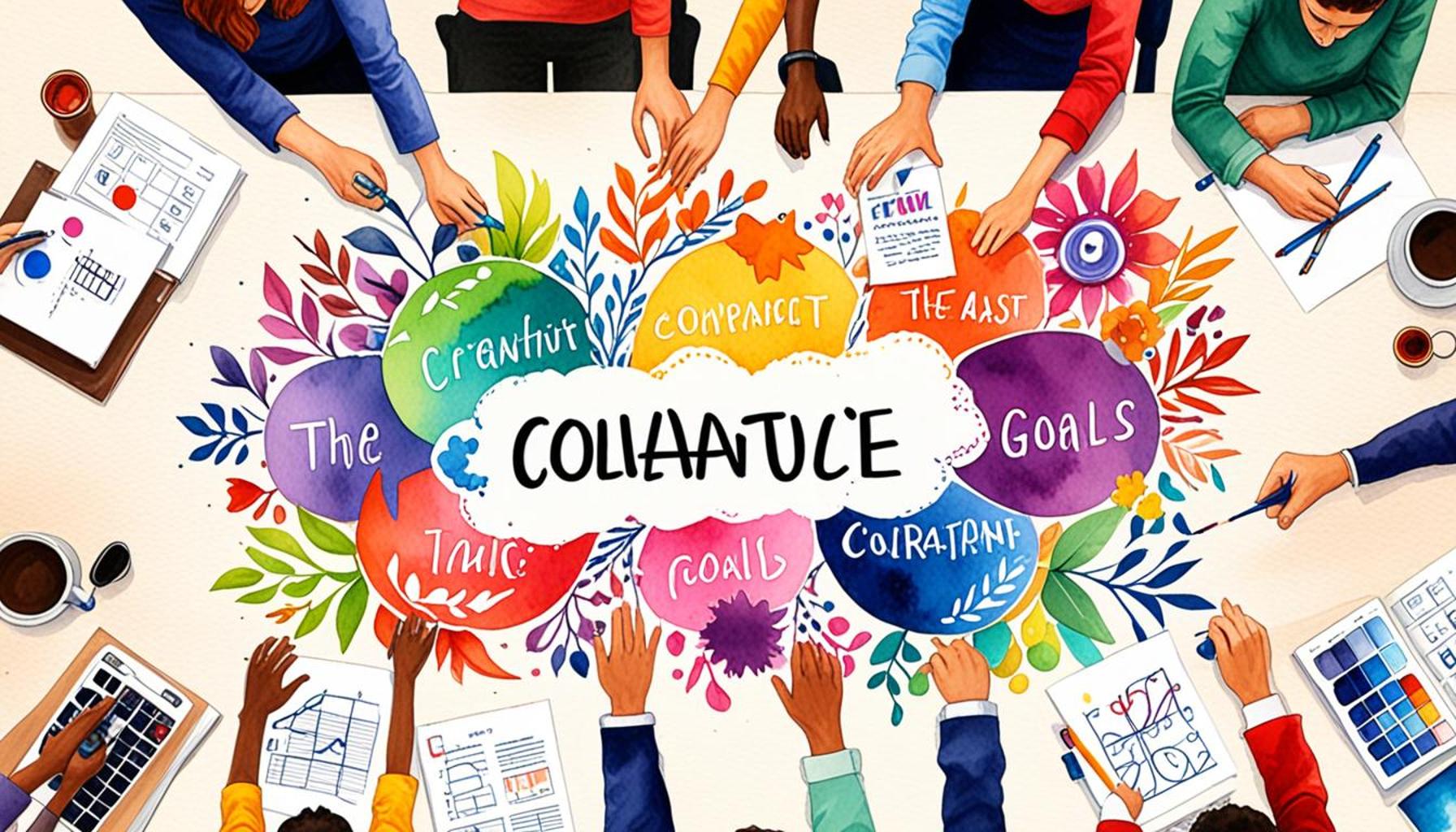Goals and Self-Discipline: How Structuring Objectives Fosters Perseverance in a Growth Mindset

The Importance of Goal Setting and Self-Discipline
In the landscape of personal development, mastering the art of goal setting and fortifying self-discipline can be pivotal in the pursuit of success. A well-defined goal acts as a compass, guiding individuals toward their aspirations and enabling them to navigate the often tumultuous terrain of life. Understanding the symbiotic relationship between structured objectives and tenacity is crucial, especially in today’s fast-paced world.
- Goals provide direction: By establishing clear goals, individuals can create a roadmap that outlines the path they need to follow. For instance, a student aiming to excel in their exams can set specific targets, such as achieving a certain grade in each subject. This clarity helps to channel their efforts effectively, making it easier to prioritize study time and resources.
- Self-discipline builds resilience: It is not enough to set goals; one must also cultivate the discipline to pursue them consistently. This resilience enables individuals to overcome setbacks. For example, an entrepreneur may face numerous challenges while starting a business, but those who maintain their focus and discipline are often the ones who ultimately succeed.
- Growth mindset fosters learning: Adopting a growth mindset allows individuals to perceive mistakes as opportunities for growth rather than as failures. This perspective is particularly significant in Nigeria’s vibrant entrepreneurial scene, where young innovators are frequently encouraged to learn from their past experiences to improve their future endeavors.
Within the context of Nigeria, a nation teeming with potential, the principles of goal setting and self-discipline resonate deeply. Many youths are awakening to the idea that clear, actionable steps are essential for translating dreams into tangible realities. Whether it’s launching a tech startup or developing agricultural projects, the capacity to define these steps is fundamental.
- Understanding that consistent efforts can culminate in revolutionary achievements is vital. The story of a young Nigerian entrepreneur who starts with a simple idea but slowly builds a thriving business serves as a testament to this principle.
- Moreover, community support systems can also enhance this journey, as collaboration often leads to shared success. By establishing networks, individuals can motivate each other and hold one another accountable.
As we delve deeper into the intricate link between goals, self-discipline, and a growth mindset, it becomes evident how deliberate planning bolsters perseverance. This not only paves the way for personal achievements but also empowers individuals to surmount various obstacles in their path. Such interplay between these concepts is invaluable and beckons a new generation to embrace them as mechanisms for shaping their futures and leaving a legacy of success and self-improvement.
LEARN MORE: This related article may interest you
Harnessing the Power of Structured Objectives
The process of goal setting transcends mere wishful thinking; it involves a strategic approach that can significantly enhance personal and professional outcomes. When individuals establish structured objectives, they lay a foundation upon which self-discipline can thrive. This interdependence between clearly defined goals and self-discipline creates a robust framework that not only facilitates progress but also fortifies one’s commitment to long-term aspirations.

- Specificity breeds clarity: In the realm of goal setting, specificity is paramount. For instance, a young graduate in Lagos eager to secure a job in the tech industry should establish specific targets such as acquiring certain certifications or attending networking events relevant to their field. This level of detail fosters a clearer path, making it easier to devise actionable steps toward their desired outcome.
- Measurable milestones enhance motivation: Goals should also be measurable. Individuals can break down their larger aspirations into smaller milestones, creating a sense of accomplishment at each stage. For example, an aspiring author in Abuja could aim to write a chapter each month, making the writing journey less daunting and more manageable.
- Time-bound objectives ensure accountability: Establishing a timeframe for achieving goals introduces a necessary sense of urgency. By incorporating deadlines, whether it’s for completing a business plan or applying for a scholarship, individuals can hold themselves accountable. This is especially relevant in a competitive environment like Nigeria, where timely execution of ideas can be the difference between success and stagnation.
Furthermore, the concept of self-discipline cannot be overlooked in this equation. Self-discipline is the steady commitment to pushing through challenges and maintaining focus on the objectives set. In Nigeria, where the hustle culture is prevalent, cultivating self-discipline can be challenging yet rewarding. The practice of setting a strict daily routine can help reinforce productive habits, particularly for students juggling academic expectations and internships.
One powerful strategy in honing self-discipline is the technique of time-blocking, where individuals allocate specific time slots for their tasks. For example, a college student preparing for finals could block out time slots for studying, attending study groups, and engaging in self-care. This deliberate approach not only nurtures a sense of accountability but also minimizes distractions, thus fostering an environment conducive to achieving set goals.
As we explore the dynamics between structured objectives, self-discipline, and the cultivation of a growth mindset, it becomes evident that these elements work in harmony to reinforce perseverance. Such alignment not only enhances personal fulfillment but also nurtures a broader understanding of how setbacks can serve as powerful catalysts for growth and innovation.
Understanding the Dynamics of Goal Setting and Self-Discipline
The journey of cultivating a growth mindset is inherently linked to the art of effective goal setting. When individuals establish clear and structured objectives, they not only create a roadmap to success but also enable a platform for self-discipline to flourish. Setting specific, measurable, attainable, relevant, and time-bound (SMART) goals transforms vague aspirations into tangible milestones. This strategic approach to goal setting ignites motivation and commitment, essential components of perseverance.In this context, self-discipline becomes the driving force that propels individuals through challenges and setbacks. Embedding routines that align with set objectives reinforces habits over time, making it easier to remain focused even when faced with distractions. For instance, the act of writing daily goals can significantly increase accountability, ensuring that individuals stay on track and motivated.Moreover, embracing a growth mindset encourages reflection on progress. Individuals learn to view challenges not as insurmountable obstacles but as opportunities for learning and improvement. This reframing fosters resilience, allowing for a more positive response to failure. Through deliberate practice and adaptation, people can enhance their skills and capabilities, which further strengthens their perseverance.Commitment to personal development emerges as a core benefit of this framework. By constantly evaluating and refining their goals, individuals cultivate a clear sense of purpose. The motivation to achieve these goals leads to sustained effort, reinforcing the cycle of growth. This interplay between goal setting, self-discipline, and perseverance is essential for anyone seeking to thrive in personal and professional realms.The implications of this dynamic are profound. By structuring objectives thoughtfully, individuals can not only cultivate self-discipline but also unlock their full potential. It empowers them to face challenges with confidence and optimism, reinforcing a lasting growth mindset that is crucial in today’s ever-changing world. As we delve deeper into the principles of goal setting, we uncover strategies that can transform actions into results, thereby enhancing our understanding of how focused efforts can yield remarkable achievements. Exploring these strategies can lead to a richer comprehension of how to establish meaningful objectives, enhancing not just individual growth but also contributing to the development of stronger, more resilient communities.
RECOMMENDED: Check out this similar article
Cultivating Resilience Through Feedback and Reflection
Another critical component in the realm of goals and self-discipline is the practice of integrating feedback and reflection into the goal-setting process. In many instances, individuals may find themselves deviating from their planned trajectories, be it due to unexpected challenges or personal circumstances. Recognizing that these deviations are opportunities for growth can significantly alter one’s approach to obstacles.
- Embracing constructive feedback: In Nigeria’s fast-paced environment, receiving feedback—whether from peers, mentors, or supervisors—can be transformative. By actively seeking out critiques on their strategies and progress, individuals can gain valuable insights and adjust their goals accordingly. For instance, a small business owner in Ibadan who regularly consults with experienced entrepreneurs can refine their market approach, leading to improved sustainability and growth.
- Reflective practices enhance adaptability: Incorporating regular reflection sessions serves as a powerful tool for self-discipline. Reflecting on what strategies worked, what didn’t, and why provides a framework for improvement. A student in Lagos, for instance, might set aside time every week to evaluate their study habits and exam performances, then make necessary adjustments to their studying techniques. This adaptability is synonymous with a growth mindset, allowing for an evolution of objectives in pursuit of excellence.
Moreover, the process of setting realistic and achievable short-term goals amplifies motivation, incrementally building confidence and discipline. It is often easier for individuals to commit to engaging in small steps rather than overwhelming themselves with the enormity of a long-term aspiration. For instance, an aspiring filmmaker in Abuja could focus on completing one scene at a time, eventually stitching these scenes into a full narrative. Each completed scene reinforces their discipline, progressively nurturing the drive toward achieving the larger goal.
The societal landscape in Nigeria, marked by both economic challenges and vibrant entrepreneurial spirit, highlights the importance of community support in fostering self-discipline as well. Collaborative goal setting, wherein individuals align their objectives within group settings, can lead to shared accountability and mutual encouragement. A group of students forming a study circle, for instance, can bolster one another’s resolve, setting collective goals—like preparing a joint presentation or research project—which keeps everyone on track while fostering a sense of camaraderie.
Furthermore, digital tools have emerged as powerful allies for individuals striving to maintain focus and discipline. Apps designed for productivity, such as Trello or Todoist, allow users to break down their goals into manageable tasks, track progress, and set reminders. These tools are particularly beneficial for young professionals in Nigeria, who often juggle various commitments and require a structured approach to goal achievement.
In the intricate dance between structured objectives and self-discipline, feedback and reflection serve as the rhythm that encourages persistence. This dynamic interaction not only fosters perseverance but also ingrains a mindset aligned with continuous growth. Whether navigating professional aspirations or personal ambitions, this harmonious relationship offers a pathway to overcoming challenges and reaping the rewards of dedication and hard work.
SEE ALSO: Click here to read another article
Conclusion: The Synergy of Goals and Self-Discipline in Achieving Growth
In the journey toward personal and professional development, the intersection of goals and self-discipline emerges as a powerful catalyst for fostering a growth mindset. Understanding that every challenge and setback is an opportunity to learn can significantly reshape one’s approach to achieving their objectives. By integrating feedback and reflective practices into their daily routines, individuals can ensure that they remain adaptable and open to growth, continuously refining their strategies in alignment with their aspirations.
The role of realistic short-term goals cannot be overstated; these incremental steps not only facilitate progress but also build the confidence necessary for pursuing larger dreams. For many in Nigeria, the ability to set actionable goals, coupled with the support of a collaborative community, enhances motivation and accountability. Whether it is a group of students studying together or entrepreneurs sharing insights, this communal aspect further reinforces the discipline required to persevere.
Moreover, the utilization of digital tools to structure tasks offers a modern solution for maintaining focus amidst life’s myriad distractions—an invaluable resource for Nigeria’s ambitious youth. As they navigate the complexities of their goals, these tools serve as reminders and guides, helping individuals organize their paths to success effectively.
Ultimately, embracing a mindset that views persistence as a pathway to growth will empower people to overcome obstacles, enabling them to realize their full potential. The marriage of structured objectives and self-discipline not only lays the foundation for individual achievement but also cultivates a collective spirit of resilience and innovation within Nigeria’s vibrant society. As we step forward, let us continue to explore new strategies and insights that encourage the unyielding pursuit of our goals.



